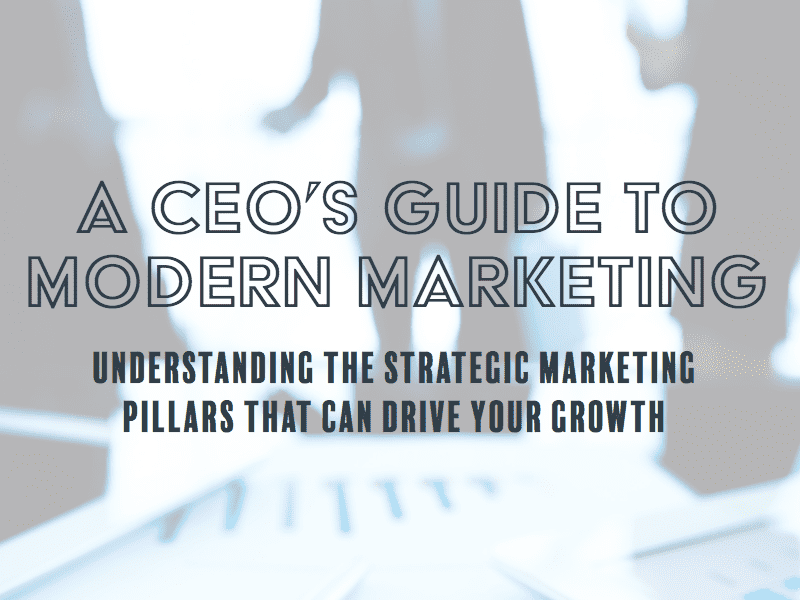B2B Marketing Tactics & Goals: How to Focus on Fundamentals
We hear it every weekend during football season: “The losing team did not execute the fundamentals.” But oddly, we don’t hear it all the time in marketing.
In recent memory, we’ve seen marketing game changers like the emergence of mobile everything, the domination of social media, and the rise of marketing automation tools. And many marketers have gotten so hung up on what comes next that they’ve lost sight of the fundamentals that support business goals.

To succeed in this new world, we can’t let the next new thing distract us. We have to stay focused on executing basic marketing fundamentals like strategy, targeting, positioning, crafting a message, communicating, and selling.
Remember how your B2B marketing tactics support the overall business goal.
I grew up on a dairy farm, and I think it offers a great analogy for thinking about B2B marketing tactics and business goals. Let’s say you’re working on the farm and someone suggests adding a buzzworthy new supplement to your cattle’s diet. How should you decide whether it’s a good idea?
- You’d need to understand how the supplement would support overall milk production (i.e., your business goal).
- You’d need to consider other supplements and nutrients the cattle are already getting (i.e., what other tactics are in play).
- You’d need to decide how to gauge success (i.e., measurement) specific to the addition of the supplement (e.g., increased production, increased market price of milk, cost of feed).
If you don’t do those things, even in the best-case scenario, you’re in for a sub-par performance.
Without the basic understanding of the needs of your target audience, and how your current resources and tactics are supporting them, you will struggle to improve your marketing. You’ll even likely end up spending more money than your business needs to.
In other words, focus on leveraging what you’ve already got before adding new tactics to the mix.
Assess your current landscape and build a formalized framework.
When we’re hired as a strategic marketing consultant, we start with an assessment of the client’s current situation. That allows us to identify which resources are in play and whether they’re being leveraged effectively. It also helps us find out the gaps between a business’s goals and the marketing tactics they’re employing.
Then we create a strategic marketing plan. This isn’t a spreadsheet of activities, a list of campaigns, a budget or set of goals. It’s a simple framework of the components the client needs to achieve its business goals.

Any company that wants marketing to contribute to business goals needs to document their plan. By formalizing how each tactic supports goals, their path to growth will be much more focused and effective.
Many organizations claim to have elaborate marketing plans. (I’m sure many are drizzled with digital buzzwords, exist solely “in their heads,” or are based on tribal knowledge of the organization only tenured team members are privy to.) But claiming is simply not good enough. Without a formal plan, the disparate pieces of your organization can’t align on goals or tactics. It leaves marketers, salespeople, product managers, and executive leadership unclear on what they’re working towards.
Define, document, share and evolve your B2B marketing tactics continuously.
Documentation of your strategic marketing plan drives collaboration among stakeholders and gives your marketers a stake in the matter by positioning them as legitimate business partners – as opposed to being perceived as a service center that reacts to one request after another.
I absolutely love seeing the aha moment—when the executive management team realizes how marketing fits in their business. When a strategic marketing plan helps them see how executing on the fundamentals can propel them from today to their desired future state.
But strategic marketing plans are not one-and-done exercises. They should be living, dynamic, formalized plans that are referred to on a regular basis and updated as the conditions or situations shift.
It’s why I’m so excited to be a part of Marketri, where it’s our job to identify business goals and then use them to assess tactical needs. We get to help companies focus on the fundamentals to help their products and services live and breathe in the marketplace. We get to keep their eye on the long-term target, and we get to help them move forward one victory at a time.
In other words, we get to help companies win.
Want More?
You can always keep up with Marketri by subscribing to our B2B Growth Marketing blog.
Image Credits:
Check out these recent insights from our subject matter experts.





